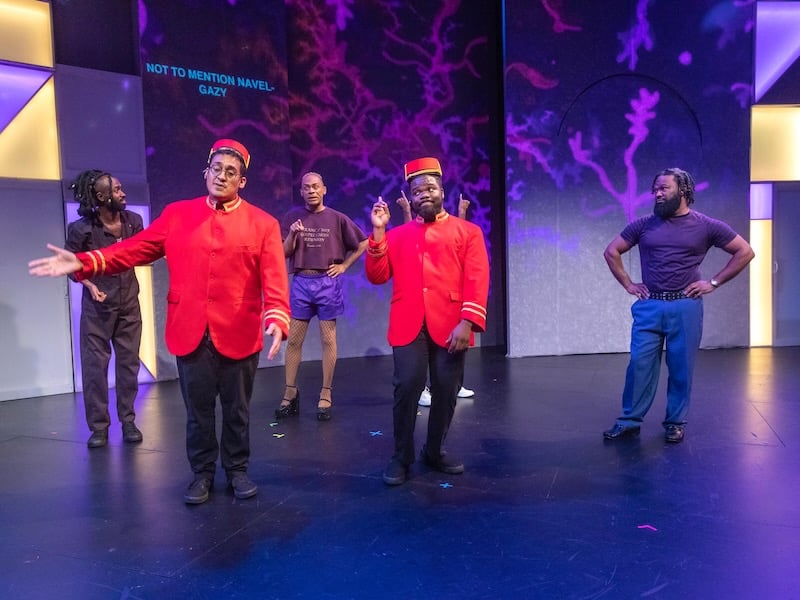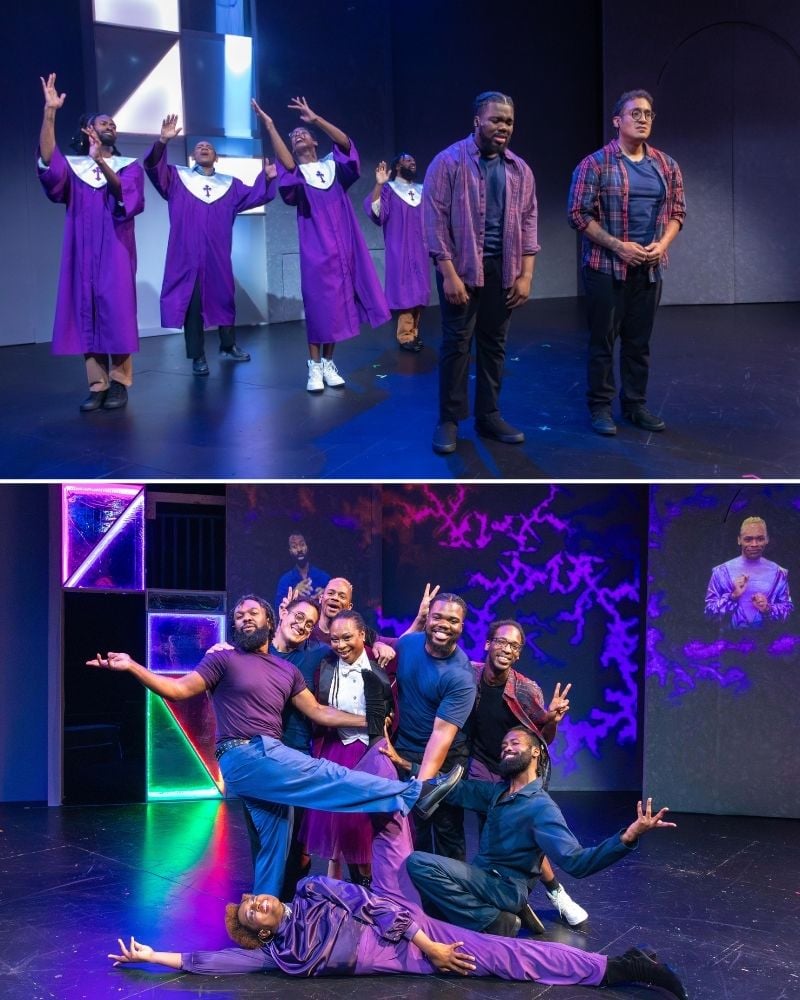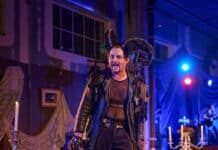The opening number of Michael R. Jackson’s musical A Strange Loop has always plunged me into a dizzying mirror world: I watch cruel reflections of myself as a queer man of color in the theater, and then the people staring back at me transform wildly. The musical opens with Usher, who introduces himself as a fat gay Black man attempting to write a “BIG BLACK AND QUEER-ASS / AMERICAN BROADWAY SHOW.” An all-Black, six-person chorus of Thoughts stands at his side, manifestations of Usher’s aching psyche. In one song, we realize Usher’s musical-in-progress is actually the very show we’re watching. And because Jackson (who wrote the show’s book, score, and lyrics) shares the same identities as Usher, we also realize A Strange Loop is a metafictional staging of Jackson’s own aching psyche.
After a 2019 off-Broadway premiere, A Strange Loop drew immense critical praise, subsequently winning the 2020 Pulitzer Prize for Drama, premiering in DC in 2021 at Woolly Mammoth Theatre Company, and winning the 2022 Tony for Best Musical. It’s surreal, then, to see the show return to DC in a new production by Visionaries of the Creative Arts (VOCA) in collaboration with Deaf Austin Theatre. Director and choreographer Alexandra Wailes has created a bilingual production performed in both English and American Sign Language (ASL). It’s a wild creative gambit for an already wildly creative show, and Wailes’ staging rings true. But like its source material, this production also rings with frustrating contradictions.

In this production’s opening number, Usher (portrayed by Hard-of-Hearing actor and ASL music performer Gabriel Silva) signs to the audience, while non-Deaf audience members hear the Voice of Usher (Tyler “T” Lang). Behind Silva, video projections of Thoughts appear alongside written English captions of their words. Soon the Thoughts arrive onstage: three actors who perform and sign in American Sign Language (Mervin Primeaux-OBryant, Malik Paris, Wade Green) and three actors who perform and sing in English (ELLISON K., Damien DeShaun Smith, Jeremy Rashad Brown). It’s only when Usher asks, “Can I really write this?” that Lang enters the stage dressed identically to Silva. The duo offer familiar but new reflections for each other.
A Strange Loop is not a show explicitly written for Deaf performers or about Deaf characters. What is gained by reviving a musical with both? The best Deaf adaptations find dramaturgical justification: their characters don’t just “happen to be Deaf,” but Deaf culture meaningfully shapes characters’ lives, relationships, motivations, and choices. For example, in Deaf West’s 2016 Broadway revival of Spring Awakening, Deaf teens struggled to communicate with non-Deaf parents because of a language barrier. When Deaf teens expressed themselves in song, they signed alongside singing counterparts — non-Deaf actors described as the Deaf characters’ “subconscious” or “guardian angels.”
In VOCA’s A Strange Loop, the Thoughts are more bullying shapeshifters than guardian angels, but that staging resonates in this uncanny show. A Strange Loop cycles through outrageous satires of Broadway, Grindr, the Chitlin Circuit, and Usher’s devout Christian parents. This Thought chorus embodies all of these characters with panache and ribald humor, bringing Jackson’s staggeringly inventive lyrics to life. As someone not fluent in ASL, I can’t speak to how well Director of Artistic Sign Language Kailyn Aaron-Loranzo has adapted Jackson’s language. I do find it harrowing and humorous to see actors sign with flopped wrists when Jackson’s script uses the word “fag.”
Wailes states in the show’s program that with a Deaf Usher, “A different and even deeper perspective is revealed with the frequency of having one’s identity being further scrutinized and challenged.” Indeed, Wailes’ direction shines when differences of identity challenge Usher. The excellent actors who portray Usher’s mother (ELLISON K. and Smith) always communicate to their son without signing. The implication that Usher’s mother is non-Deaf adds more distance in their strained relationship. That in turn makes Usher’s completely signed conversations feel all the more supportive — especially with characters portrayed by Primeaux-OBryant, who offers a charismatic presence.

This show’s combination of ASL, English, song, and captions creates a heightened theatrical language that continually surprises the audience. The absence of Simultaneous Communication (SimCom), when a person signs and speaks simultaneously, also helps performers not to water down their idiosyncratic performances.
Other times the Thoughts’ fluid staging proves frustrating. Characters like Usher’s father and agent are portrayed by Deaf and non-Deaf actors, and I wondered if these characters’ prejudices would be more clear if definitively portrayed as non-Deaf. Wailes’ complex staging sometimes feels too literal (video projections visualize language already communicated by actors) or too abstract (the use of silhouettes in a humiliating sex scene feels like a cop-out from Jackson’s raw writing).
What this production nails is Usher’s distressed relationship to his own mind. Silva and Lang’s performances bind and diverge like contrapuntal melodies. Audiences watch Usher fracture into two bodies: Silva’s performance will sometimes become earnest and sincere, while Lang simultaneously becomes exasperated and sullen. Having Usher staged by two partners-in-crime onstage risks draining the musical of its terrifying loneliness, but Wailes uses Lang’s presence purposefully. During Usher’s crucial solos and monologues, Lang will sometimes sit in the audience or stand silently beside Silva, feeling like a dissociative part of Usher’s mind.
Silva’s and Lang’s performances offer a triumphant, surrealist doubling. When Usher looks across the stage at his other self, it’s like a performer confronting his audience, or an artist staring at his own creation. To me, it felt like Lang often represented Michael R. Jackson and Silva represented members of the Deaf community. Jackson premiered this musical six years ago, but somehow Usher has twisted out of Jackson’s control. Usher’s now performed and reinterpreted by people who both share Jackson’s identities but also layer their own identities on top of his.
There are limits to this layering project, to adding on identities to shows that aren’t written with those identities in mind. When Usher states at the top of the show that he’s “able-bodied,” I went with it because not all members of the Deaf community identify as “disabled.” Yet near the climax of the show, Usher critiques the systems of oppression he’s caught in, stating “…the anti-Black world we live in gets so strung out on this color-blind ‘love is love’ bullshit.” A Deaf Usher would absolutely also call out society as anti-Deaf. But the word “anti-Deaf” is unfortunately trapped in this production’s subtext. Yes, there are fat, Black, queer men who are also Deaf — but Usher doesn’t explicitly discuss Deafness in A Strange Loop the way he does Blackness or queerness.
This is the pitfall of productions that add identities onto characters — from the “color-conscious” casting of Hamilton to the Black-led Broadway production of Gypsy to contemporary realist plays that don’t specify the races of their characters. All of these shows resonate more deeply by casting actors of marginalized identities in their main roles, but their scripts don’t actually speak directly to people of those identities in the audience. I’m reminded of August Wilson’s 1996 speech “The Ground on Which I Stand,” in which he critiqued colorblind casting for refusing to stage Black Americans’ “philosophy, mythology, creative motif, social organization, and ethos.” The Deaf community certainly has all those things, too. But despite VOCA’s resonant casting, this production of A Strange Loop can’t stage the Deaf community fully due to Jackson’s hyperspecific script.
However, this production of A Strange Loop draws out a dissonant aspect of the musical: creating art as a form of self-harm. I’ve always thought the theme connecting A Strange Loop’s vignettes was humiliation. But watching two actors stare into each other’s eyes as Usher, it felt like the older version of Jackson was forcing the younger version of himself to constantly relive his worst fears and experiences. This constant reliving is also just life. Without the older Jackson restaging the younger Jackson, A Strange Loop would never exist at all.
I think about the 20-year-old version of myself who first listened to A Strange Loop in 2019, feeling like his world had dramatically cracked open. I know the unbearable pain he’ll go through in the next six years, and part of me wants to remove him from the loop, to end his suffering. Still, I know he’ll become the person who nervously goes back to see that same musical in 2025. He’ll discover another version of himself, beautifully performed, staring back at him onstage. He’s ready for the next verse of a familiar but somehow new song.
Running Time: One hour and 40 minutes.
A Strange Loop plays through August 10, 2025, presented by Visionaries of the Creative Arts and Deaf Austin Theatre, performing in the Sprenger Theatre at Atlas Performing Arts Center, 1333 H St NE, Washington, DC. Tickets range from $29.25-$45.25 (fees included) and are available online.
The program for A Strange Loop is online here.
Ages 18+ (adults only). Content Warnings: Mild use of flashing or strobing lights. Frequently occurring swearing or coarse language. Regularly occurring sexual content. Mild references of self-harm, sexual assault, and grief.
Aboug this collaboration, playwright and Pulitzer Prize winner Michael R. Jackson said:
“I am thrilled that Deaf Austin Theatre and Visionaries of the Creative Arts are collaborating to bring A Strange Loop to their audiences. Though A Strange Loop is told through Usher’s very specific lens, it has always been my intent that his story resonates universally throughout the human condition. I believe these two theaters will crack the piece open even further in a unique way that only they can do and for that reason, I enthusiastically support this co-production.”
A Strange Loop
Book, Music and Lyrics by Michael R. Jackson
Directed and choreographed by Alexandria Wailes
CAST
Usher – Gabriel Silva
Voice of Usher – Tyler “T” Lang
Thought 1 – Mervin Primeaux-OBryant
Thought 2 – ELLISON K.
Thought 3 – Malik Paris
Thought 4 – Damien DeShaun Smith
Thought 5 – Wade Green
Thought 6 – Jeremy Rashad Brown
Swing – Elbert Joseph
Swing – Terrence Berry
CREATIVE TEAM
Producer, Artistic Director, VOCA – Michelle Banks
Producer, Artistic Director, DAT – Brian Cheslik
Director and choreographer, Associate Artistic Director, VOCA – Alexandria Wailes
Associate Director / Music Supervisor – Stanley Bahorek
Music Director – Walter “Bobby” McCoy
Director of Artistic Sign Language (DASL) – Kailyn Aaron-Lozano
Creative Service Manager – Def Lens Media
PRODUCTION & DESIGN TEAM
Line Producer – Andrew Morrill
Production Manager – Bethany Slater
Stage Manager – Sarah Poole
Assistant Stage Manager – Katie Loyd
Assistant Stage Manager – Jason Eastman
Lighting Designer – Helen Garcia-Anton
Set Designer – Jessica Trementozzi
Costume Designer – Isabelle Fields
Sound Designer – Liv Farley
Projection Designer – Julian Kelley
Caption Designer – Andres Poch
Intimacy Director – Emily Sucher
SEE ALSO:
Deaf theater companies co-produce fresh staging of ‘A Strange Loop’ (news story, July 8, 2025)



